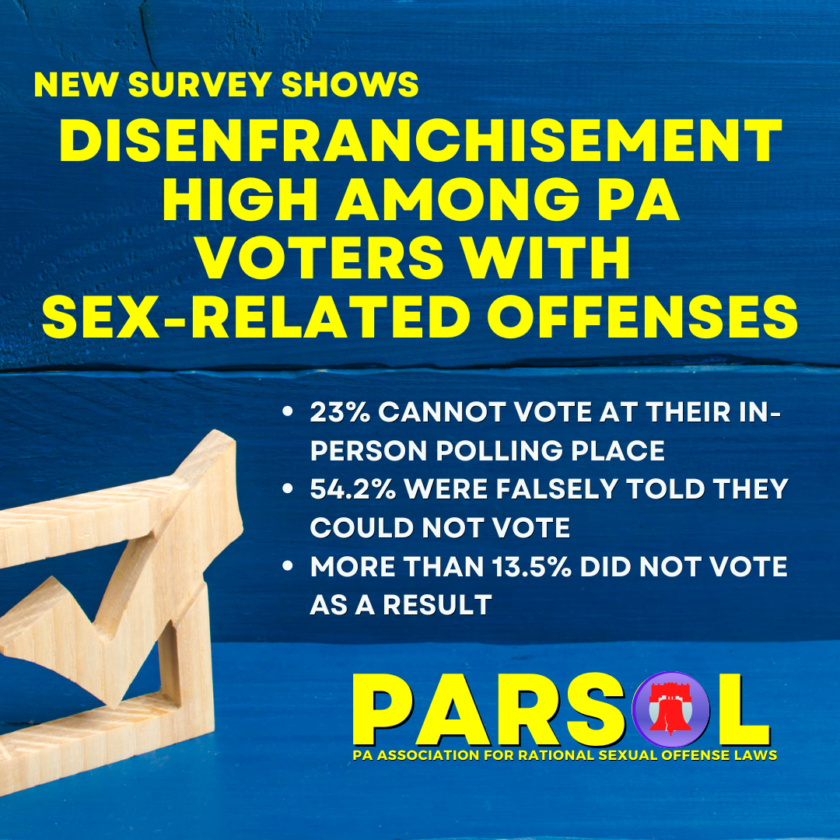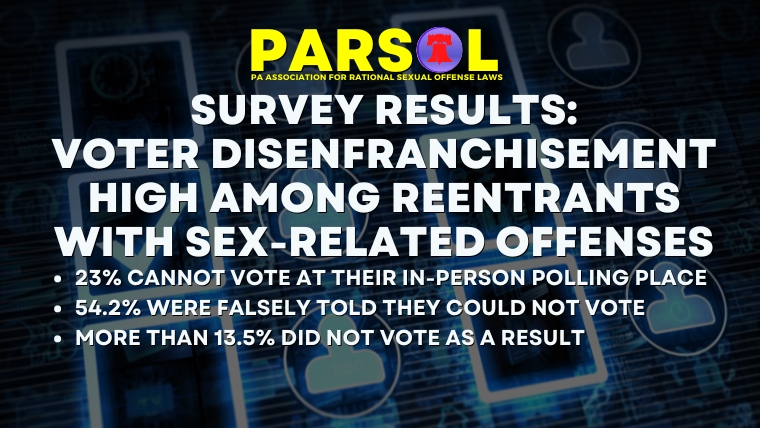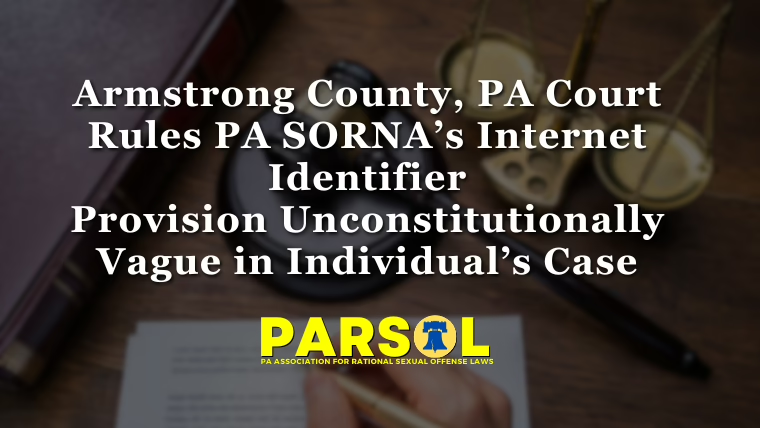Originally posted 5/3/24 – Updated 7/15/24 with JSGC information.
Pennsylvania HR 47 is a 2023 Resolution directing the Pennsylvania Joint State Government Commission to conduct a study on voting patterns and knowledge about voting rights among formerly incarcerated qualified electors in Pennsylvania and submit a report of its findings and recommendations to the House of Representatives. In response to this study, The Pennsylvania Association for Rational Sexual Offense Laws (PARSOL) surveyed formerly incarcerated members (n=61). The results shed a startling light on the challenges facing justice-involved individuals in exercising their fundamental right to vote, despite the absence of legal restrictions in Pennsylvania. The Pennsylvania Joint State Government Commission (JSGC) published Voting Rights of the Formerly Incarcerated: Knowledge, Outreach, and Data Patterns of Qualified Electors in Pennsylvania on July 12, 2024 which cites PARSOL’s research.
Finding 1: Voter Registration and Civic Engagement High
Most participants had registered to vote prior to their incarceration (87.93%). After being released from incarceration, 93% of participants stated they planned to vote. 65.52% of participants say that their involvement in the justice system increased their desire to participate in the electoral process.
Finding 2: Disenfranchisement High
Pennsylvania has no law or policy denying individuals their right to vote once they are released from incarceration. More than half (54.2%) of reentrants were told that their criminal history prevented them from voting. Of those:
- 25% believed this and did not vote instead.
- 40% knew that this was not true.
- 35% researched their rights and found out that it was untrue.
- 73% of those who were told they could not vote by someone, asked their supervising officer who clarified they could vote.
- Of great concern is the 26.02% who were told they were not allowed to vote by a Department of Corrections employee, parole officer, or probation officer.
Finding 3: Proximity Restrictions are a Significant Barrier to In-Person Voting
Parole and Probation Regulations, at federal, state, and county levels, often impose proximity restrictions on individuals with crimes of a sexual nature. Frequently the locations individuals cannot be within a certain distance of, such as schools, public libraries, or parks are the same public venues used as polling places.
Approximately 23% of respondents stated that voting in-person at their polling place would cause them to violate the terms of their supervised release and could send them back to incarceration. Of these, 15.4% ended up not voting, 7.7% had to receive a special permit from their supervising officer to vote in person, and 76.92% were forced to vote using an absentee or mail-in ballot, stating they were “unable to appear in person” on Election Day.
Additional Feedback
Survey respondents were given the opportunity to provide feedback about their related experiences. These responses include:
- I was threatened with incarceration/violation of my conditions if I voted while on parole.
- The halfway house I was staying at upon release said that voting was not something you could be off property for.
- When I was released on parole my officer told me I would never have the right to vote again.
- I don’t vote anymore because my polling place is at a school, and I prefer to do my voting in person. All I want to do is vote and leave but can’t under supervision.
Our Recommendations
- Provide an easy-to-understand document about their voting rights to every reentrant upon release from incarceration.
- Enact laws/policies that require parole and probation to make accommodations for supervised persons to vote.
- Include information in SORNA correspondence from the Pennsylvania State Police (sent to remind all registrants about their registration deadline) about voting rights, processes, a voter registration form, and how to vote by mail.
- Enact a law making it illegal for a reentry housing provider to deny an eligible elector time to vote.
- Provide voting rights education for reentrants as required training at least twice annually for all correctional personnel including correctional officers, parole, and probation agents at state and county levels.

Take Action by Amplifying this News
We know many of you are not on social media for one reason or another, but if you are, please consider amplifying our message by liking and sharing our posts at these links:




![stuckIn1995_rally_header - PARSOL - Pennsylvania Assoc for Rational Sex Offense Laws (PA Megan's Law Resources) PARSOL Board Chair Josiah Krammes speaks at the PA Capitol Rotunda flanked by State Reps. Emily Kinkead and Tim Briggs (28 Oct 2025) [John Dawe/PARSOL]](https://parsol.org/wp-content/uploads/2025/10/stuckIn1995_rally_header.avif)